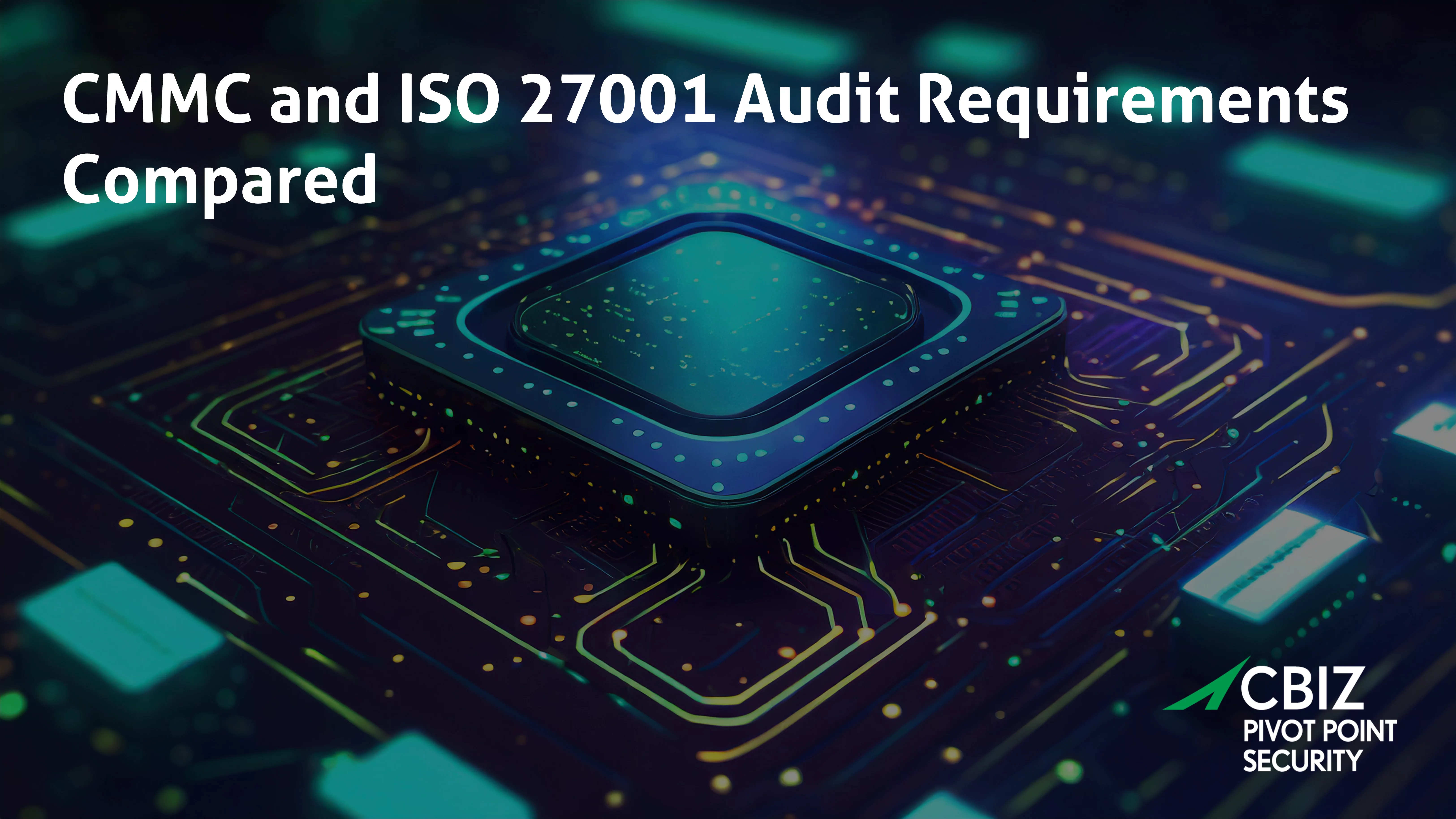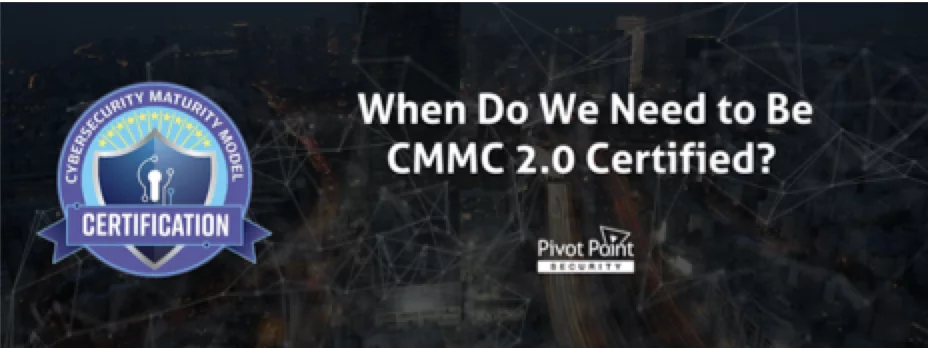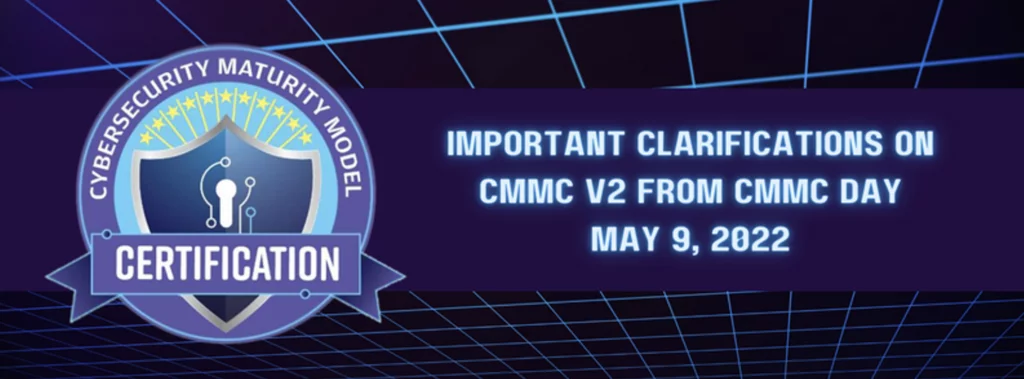Last Updated on May 5, 2025
If your business competes within the US defense industrial base (DIB) and is ISO 27001 certified, you should strongly consider integrating Cybersecurity Maturity Model Certification (CMMC) Level 2 compliance into your ISO 27001 information security management system (ISMS). This could simplify your cybersecurity governance program and significantly reduce the time and effort required to achieve and maintain a CMMC Level 2 certification, while increasing the business value of your ISO 27001 investments and expertise.
But how do the audit requirements for these two cybersecurity standards compare? For ISO 27001 certified DIB orgs preparing for their upcoming CMMC Level 2 assessment, this post highlights key additional issues you should be aware of.
Key takeaways
- An ISO 27001 certified ISMS can strongly support CMMC certification and greatly reduce CMMC compliance effort.
- The key question for ISO 27001 certified DIB orgs is: What is most important for your business to specifically address so your ISMS can most efficiently and effectively support CMMC 2.0 Level 2 compliance and certification?
- Preparing for a CMMC Level 2 third-party assessment includes some additional concerns versus getting ready for an ISO 27001 external audit.
How do ISO 27001 and CMMC compare?
As an internationally recognized standard for demonstrating robust cybersecurity and compliance, ISO 27001 helps organizations of any size and industry build a holistic cybersecurity program that lets you identify and protect all your sensitive information assets, from financial data to employee personal data (PII) to trade secrets.
CMMC has a much narrower focus on protecting controlled unclassified information (CUI) and federal contract information (FCI) belonging to the US government wherever it resides on contractors’ and vendors’ systems. While other federal agencies are adapting it to their needs, the Department of Defense (DoD) developed CMMC to protect US national security and economic interests. Lax cybersecurity and our adversaries’ rampant exfiltration of sensitive unclassified data have been a massive ongoing problem across the DIB.
Renowned for its flexibility and applicability to virtually any use case, ISO 27001 allows you to choose the specific controls you need based on best-practice risk assessment and risk management. CMMC, in contrast, defines the controls you must implement based on the CMMC maturity level (1 through 3) specified in your contract. There are no “non-applicable” CMMC controls as there are with ISO 27001.
The CMMC maturity levels directly correlate to the sensitivity of government data associated with a contract:
- CMMC Level 1 defines “foundational” cybersecurity that is adequate to protect FCI but not CUI. This compliance level requires companies to implement 15 controls specified in 48 CFR 52.204-21, which map to 17 controls in the NIST 800-171 Rev. 2 standard, Protecting Controlled Unclassified Information in Nonfederal Systems and Organizations. Organizations can self-attest to CMMC Level 1 compliance by following the DoD’s assessment guidance.
- DIB orgs that handle CUI as well as FCI will need to comply with CMMC Level 2 (Advanced), which specifies the identical set of 110 controls in NIST 800-171 Rev. 2. Like ISO 27001, achieving CMMC Level 2 certification requires passing a third-party compliance assessment.
- CMMC Level 3 (Expert) is reserved for a small minority of organizations working on the DoD’s most sensitive programs (e.g., missile systems, nuclear submarines, fighter aircraft). Based on NIST 800-171 plus the 35 controls in NIST 800-172, CMMC Level 3 adds capabilities to mitigate advanced persistent threats (APTs) perpetrated by nation state level threat actors. Achieving CMMC Level 3 requires a third-party CMMC Level 2 assessment followed by a DoD-led assessment.
Bottom line: Since CMMC is more prescriptive than ISO 27001, to satisfy both sets of requirements you may need to implement specific technical controls and tap into specific expertise beyond what ISO 27001 compliance based on risk assessment would require. This is why the DoD has not approved reciprocity between ISO 27001 and CMMC Level 2.
Can ISO 27001 support CMMC certification?
There is no question that an ISO 27001 certified ISMS can strongly support CMMC 2.0 Level 2 certification and ongoing compliance. The potential benefits of integrating CMMC with ISO 27001 include:
- Reductions in cost, effort, and time spent on achieving and maintaining these two certifications.
- Reduced cybersecurity risk and streamlined risk management.
- Simplified cyber compliance and reduced compliance risk.
- A more robust and well governed cybersecurity posture that is highly effective at preventing data breaches.
For most ISO 27001 certified DIB orgs, the real question is not “if” if makes sense to leverage your ISMS to help drive your CMMC compliance and certification, but how best to optimize that process.
There is substantial overlap between the two standards, making a parallel implementation and/or management effort both time- and cost-effective, especially in the longer term. For a mapping of ISO 27001 controls to NIST 800-171, see NIST 800-171 Rev. 2 Appendix D (available as “supporting materials” in NIST 800-171 Rev. 3).
How do ISO 27001 audits and CMMC Level 2 assessments compare?
How do the major preparatory steps differ between ISO 27001 and CMMC Level 2 assessments? Here are some important distinctions:
- Choosing an auditor. Both ISO 27001 and CMMC Level 2 require a third-party audit by an authorized entity only. With ISO 27001, the auditor must be accredited by members of the International Accreditation Forum, like the ANSI National Accreditation Board (ANAB) in the US or the United Kingdom Accreditation service (UKAS) in the UK. To undergo a CMMC Level 2 assessment, you must connect with a CMMC third-party assessment organization (C3PAO) certified by the Cyber AB, the official accreditation body of the CMMC ecosystem.
- Defining in-scope data and systems. Defining the scope or boundaries of the environment to be assessed is critical for both ISO 27001 and CMMC Level 2 audits. If you plan to include your CMMC environment within your ISO 27001 ISMS, you will need to explicitly extend your ISMS scope to encompass the CMMC environment, which should relate as exclusively as possible to your CUI and FCI.
- Performing an internal audit. Before undergoing a C3PAO audit, you need to complete an internal audit to identify any areas where you are out of CMMC Level 2 compliance and create a roadmap to address these.
- Defining Plans of Action & Milestones (POA&Ms). Unlike ISO 27001, CMMC Level 2 makes provisions for POA&Ms to remediate certain control gaps over a limited time period as part of the audit. During your pre-assessment process you can optionally define POA&Ms and still receive a conditional CMMC Level 2 certification.
- Document how CMMC controls are met. To support the CMMC audit process you will need to document in your ISO 27001 statement of applicability how you have met each of the CMMC controls, along with who owns each control and what ISO 27001 policies apply to it. Then cross-reference this documentation in your CMMC system security plan (SSP), which should be separate from your ISO 27001 SSP.
- Gather appropriate compliance evidence. To validate compliance, a third-party auditor will need to see not just documentation but also ongoing operational data showing the effectiveness of your CMMC-specific controls.
- If you engage a consulting partner, be aware of caveats. An expert consulting partner or technology specialist can help strategize and/or implement new CMMC Level 2 controls and assess their operation. But note that any third party that assists an organization seeking CMMC certification (OSC) with implementing or assessing their CMMC environment cannot conduct the CMMC audit. A C3PAO can offer general guidance pertaining to the assessment but cannot provide consulting services to a business they will later assess.
For more information on how ISO 27001 ISMS audits and CMMC Level 2 assessments compare, this episode of The Virtual CISO Podcast features Thomas Price, Information Security Auditor/Quality Management Professional at BSI.
What’s next?
If your business is ISO 27001 certified and you also need CMMC Level 2 certification, contact CBIZ Pivot Point Security to schedule time with a cybersecurity strategy expert who is familiar with both frameworks and how to harmonize them.























